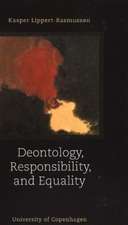Globalizing Justice: The Ethics of Poverty and Power
Autor Richard W. Milleren Limba Engleză Paperback – 18 mar 2010
| Toate formatele și edițiile | Preț | Express |
|---|---|---|
| Paperback (1) | 255.64 lei 31-37 zile | |
| OUP OXFORD – 18 mar 2010 | 255.64 lei 31-37 zile | |
| Hardback (1) | 659.53 lei 31-37 zile | |
| OUP OXFORD – 18 mar 2010 | 659.53 lei 31-37 zile |
Preț: 255.64 lei
Preț vechi: 282.05 lei
-9% Nou
Puncte Express: 383
Preț estimativ în valută:
48.93€ • 53.17$ • 41.13£
48.93€ • 53.17$ • 41.13£
Carte tipărită la comandă
Livrare economică 11-17 aprilie
Preluare comenzi: 021 569.72.76
Specificații
ISBN-13: 9780199581993
ISBN-10: 0199581991
Pagini: 350
Dimensiuni: 154 x 233 x 18 mm
Greutate: 0.53 kg
Editura: OUP OXFORD
Colecția OUP Oxford
Locul publicării:Oxford, United Kingdom
ISBN-10: 0199581991
Pagini: 350
Dimensiuni: 154 x 233 x 18 mm
Greutate: 0.53 kg
Editura: OUP OXFORD
Colecția OUP Oxford
Locul publicării:Oxford, United Kingdom
Recenzii
Richard Miller has given us a work of great political urgency concentrating on the political responsibilities of citizens of wealthy and powerful societies who interact with the worlds poor through a complex network of transactions and relationships. The theoretical position he defends is fresh and original and will lead many readers to reconsider conventional ways of thinking about global justice. It will also encourage them to engage more deeply with the literatures of world politics and global political economy, which inform the argument throughout. No other recent book on Miller's subject displays a similar combination of philosophical imagination and deep engagement in the realities of global political and economic life.
In his attempt to discover what obligations citizens of rich countries have to those in the developing world, Miller breaks a new path between radical cosmopolitanism and fair bargaining. Filled with concrete historical detail as well as philosophizing, this book is a superb example of applied ethics. Its recommendations cannot be ignored by those of us who are critical of American foreign policy, but do not know exactly what alternative to advocate. The global-warming discussion is particularly enlightening
Where Miller distinguishes himself is in his political analysis...The depth of his engagement sets a new standard for combining rigorous work in applied ethics with a detailed analysis of world politics, which all those working in international political theory will be hard pressed to meet.
Richard Miller establishes a thesis about global justice that should have been obvious for a long time ... Among other things, through his extensive study of the research done on the Iraq War, the reader will see how the U.S., the paradigm controlling developed country, has done things to maintain its power, things considerably out of proportion with the demands of global justice. Thank you Richard Miller for articulating this point with empirical and conceptual power!
In his attempt to discover what obligations citizens of rich countries have to those in the developing world, Miller breaks a new path between radical cosmopolitanism and fair bargaining. Filled with concrete historical detail as well as philosophizing, this book is a superb example of applied ethics. Its recommendations cannot be ignored by those of us who are critical of American foreign policy, but do not know exactly what alternative to advocate. The global-warming discussion is particularly enlightening
Where Miller distinguishes himself is in his political analysis...The depth of his engagement sets a new standard for combining rigorous work in applied ethics with a detailed analysis of world politics, which all those working in international political theory will be hard pressed to meet.
Richard Miller establishes a thesis about global justice that should have been obvious for a long time ... Among other things, through his extensive study of the research done on the Iraq War, the reader will see how the U.S., the paradigm controlling developed country, has done things to maintain its power, things considerably out of proportion with the demands of global justice. Thank you Richard Miller for articulating this point with empirical and conceptual power!
Notă biografică
Richard Miller is Professor of Philosophy at Cornell University.






















